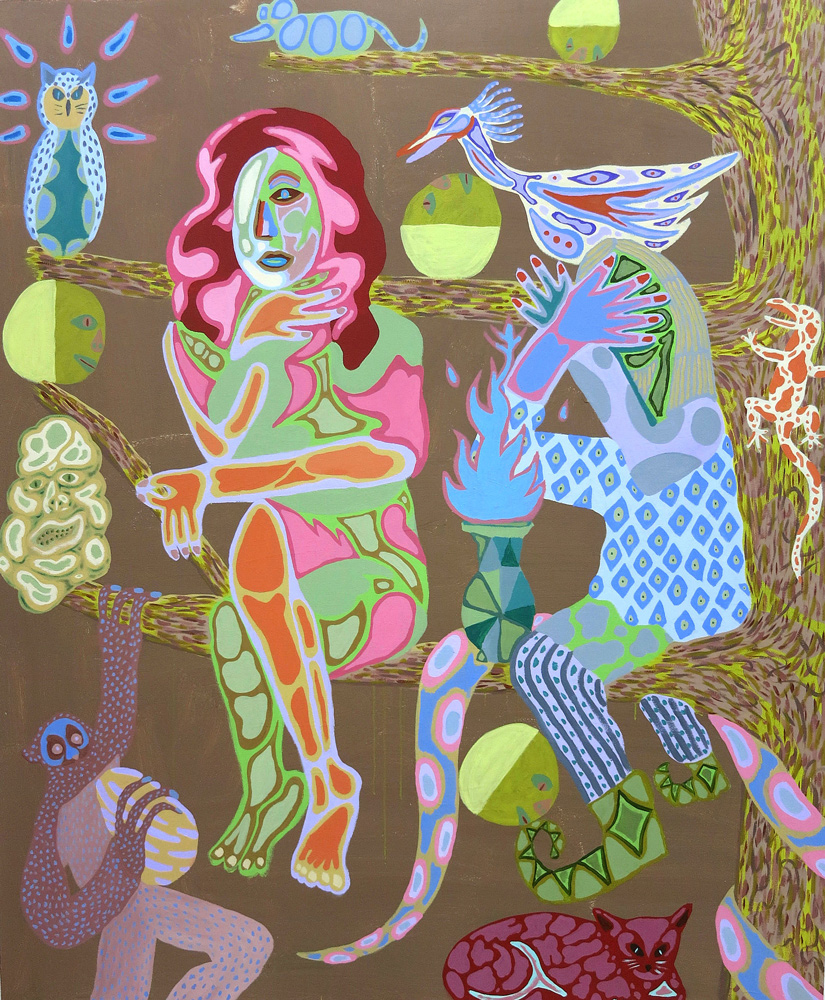
Shape-shifting between the various forms of deity, human, and animal—shamans, tricksters, medicine men, and clowns possess a divine and earthly dialectic. They are often associated with the “older level consciousness” (Jung 460) of primordial man while possessing remarkable acumen, a “strange mixture of wisdom and foolishness” (Taylor 82). The shamanic trickster’s ability to control and mediate between natural and supernatural forces have played an important role in numerous cultures, ranging from the American Indian Heyoka and Hopi clowns to European court jesters and Aztec court fools. Their humour, disobedience, and unconventional behaviour have the potential to destabilize power relations through satirical gestures and subversive acts by turning hierarchical structures upside down while imparting moral lessons that reveal social truths. For Joseph Campbell, tricksters serve to overthrow social programs. Their critical and spiritual practices make them important members of their respective societies, situating them in significant political positions.
Sacred tricksters may have lost their agency in modern times, but their mythologies continue to live in society’s cultural psyche through parables and folklore. Aside from amusement and a sense of “escape in fantasy,” folklore has also served as a “vehicle for social protest” (Aguilar 2). In “Fighting the Panopticon: Filipino Trickster Tales as Active Agency against Oppressive Structures,” Mila D. Aguilar narrates an example of the marginalized overcoming the dominant power through the famous trickster tale of Juan Pusong, a Visayan cultural hero who is characterized as very mischievous yet sapient. Aguilar narrates:
As a result, Juan Pusong becomes king, fooling his tyrannical oppressor through his sharp wit and cunning tactics. The narrative illustrated by Juan Pusong thus becomes a “reflection and weapon of class conflict” (Aguilar 2).
About the Artist
About the Artists

Patrick Cruz (b. 1987) is a Filipino-Canadian artist and organizer living and working in Toronto, Canada and Quezon City, Philippines. Cruz studied painting at the University of the Philippines and received his BFA from Emily Carr University of Art + Design in Vancouver, Canada and holds an MFA at the University of Guelph in Ontario, Canada. In 2015, Cruz won 1st place for the 17th annual RBC Canadian Painting Competition held at the Contemporary Art Gallery of Vancouver.
Cruz is the founder and director of Kamias Special Projects, an artist-run space in Kamias, Quezon City that acts as a cultural embassy between cultural producers from North America and Southeast Asia. Since 2014, KSP has been the platform for hosting the Kamias Triennial, a tri-annual event that fosters cross-cultural dialogue, open-ended community practices, and experimental curatorial strategies.
Driven by folk sentiment, his multi-disciplinary practice is informed by his interest in cultural hybridity, strategies of decolonization and the paradoxical effects of globalization. Cruz has been the recipient of numerous grants and has lectured and conducted artist talks in various cultural institutions in Vancouver, Toronto, Edmonton, Montreal, Mexico City and Quezon City, Philippines. His work has been shown nationally and internationally and has been reviewed and featured in Canadian Art magazine, Border Crossings magazine, C magazine and online platforms such as akimbo and public parking.
Related Exhibitions
About the Artists
About the Artist
Patrick Cruz (b. 1987) is a Filipino-Canadian artist and organizer living and working in Toronto, Canada and Quezon City, Philippines. Cruz studied painting at the University of the Philippines and received his BFA from Emily Carr University of Art + Design in Vancouver, Canada and holds an MFA at the University of Guelph in Ontario, Canada. In 2015, Cruz won 1st place for the 17th annual RBC Canadian Painting Competition held at the Contemporary Art Gallery of Vancouver.
Cruz is the founder and director of Kamias Special Projects, an artist-run space in Kamias, Quezon City that acts as a cultural embassy between cultural producers from North America and Southeast Asia. Since 2014, KSP has been the platform for hosting the Kamias Triennial, a tri-annual event that fosters cross-cultural dialogue, open-ended community practices, and experimental curatorial strategies.
Driven by folk sentiment, his multi-disciplinary practice is informed by his interest in cultural hybridity, strategies of decolonization and the paradoxical effects of globalization. Cruz has been the recipient of numerous grants and has lectured and conducted artist talks in various cultural institutions in Vancouver, Toronto, Edmonton, Montreal, Mexico City and Quezon City, Philippines. His work has been shown nationally and internationally and has been reviewed and featured in Canadian Art magazine, Border Crossings magazine, C magazine and online platforms such as akimbo and public parking.

Related Exhibitions

Share




















